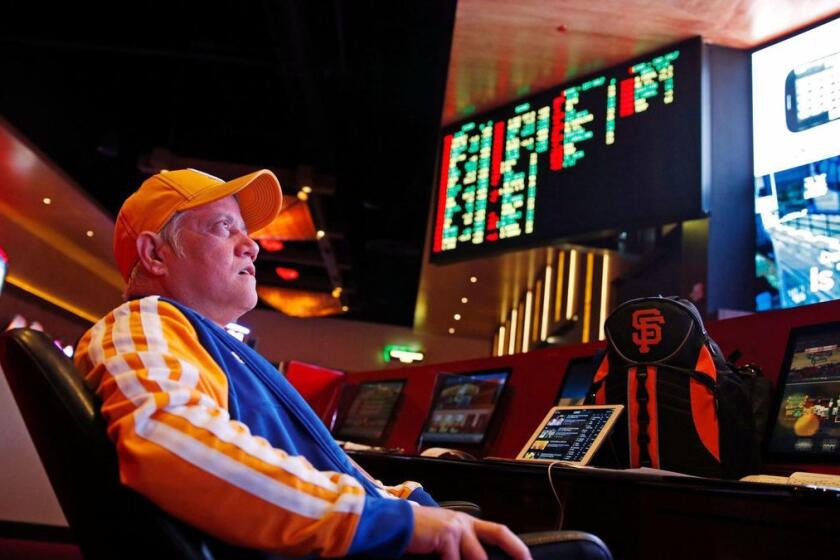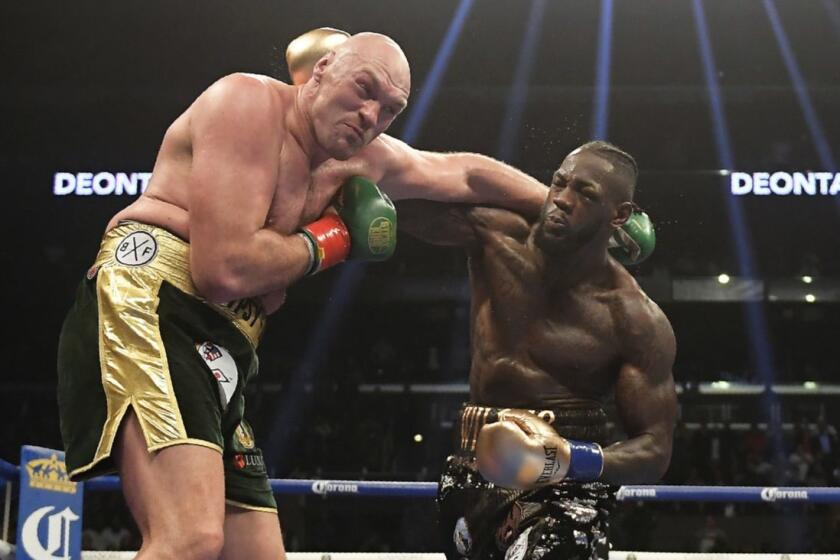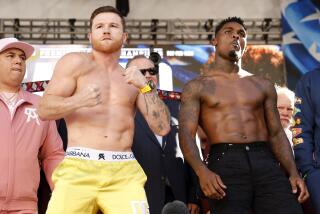Tyson Fury addresses mental health as he prepares for rematch with Deontay Wilder
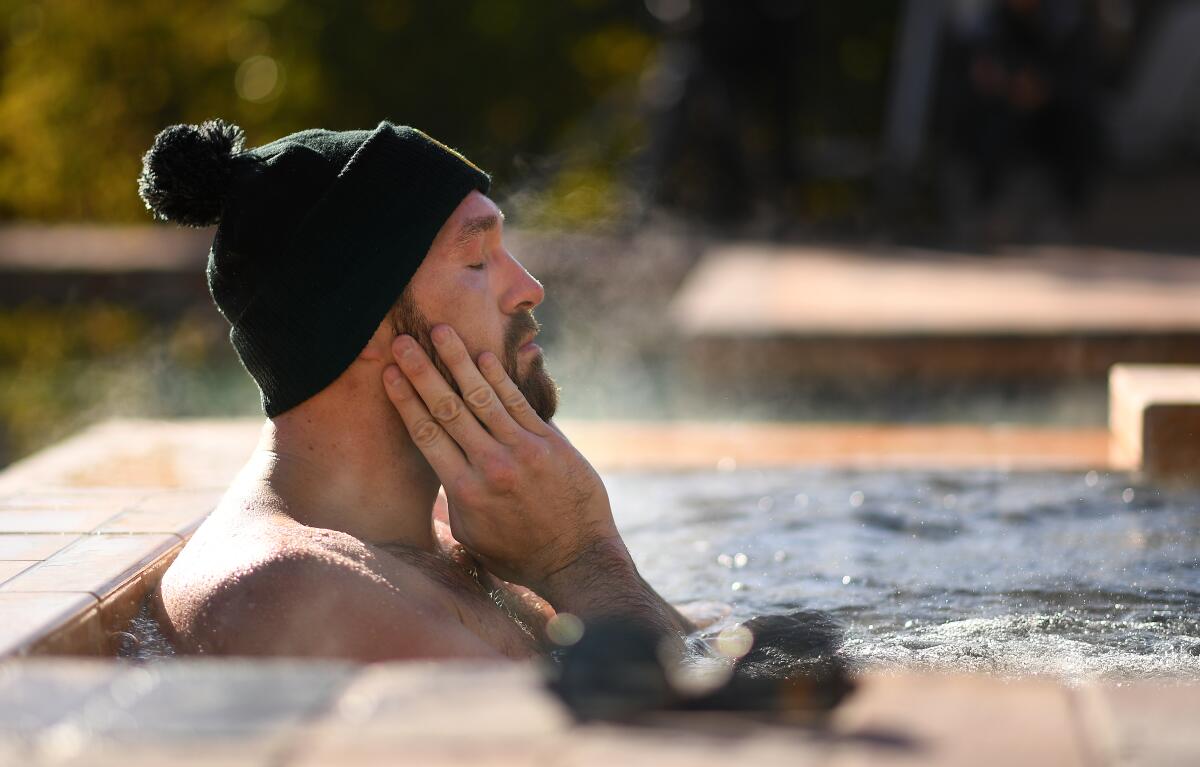
- Share via
LAS VEGAS — Tyson Fury has proven to be enigmatic and complicated, but he also rarely hesitates to speak about sensitive topics. He’s a boxer who pulls no punches.
For example, one day last week, he tells visitors he has been depressed since the minute he woke at 6 a.m.
Exactly why his mood swings as violently as his fists he can’t quite explain. He is surrounded by friends, family and comfort, yet it wasn’t until a training run three hours after he woke that Fury felt fine again.
The 31-year-old certainly looks relaxed now. He has chosen to give a scheduled interview while soaking in his backyard hot tub, his arms stretched back, elbows resting on the ledge.
On Feb. 22 at MGM Grand on the Las Vegas Strip, the unbeaten heavyweight will meet Deontay Wilder in a rematch of their controversial split draw Dec. 1, 2018, at Staples Center. The fight will take place about 10 miles from where he’s sitting, before a sold-out crowd and huge pay-per-view audience. But rather than discussing Wilder, the conversation turns toward another opponent, one that has knocked down Fury and beaten him more than once.
Mental health issues.
Momentum is building in California to legalize wagering on athletic contests, setting off intense competition among rival gambling interests.
During a stretch from 2015 through 2018, Fury was a shadow of himself because of his addictive personality. Shortly after reaching the climax of his career in 2015 by upsetting long-reigning heavyweight king Wladimir Klitschko for multiple world titles, the British-born boxer who’d climbed his personal Mt. Everest quickly collapsed. He was battling daily thoughts of suicide even when he had nothing to be upset about.
With a career-defining win in his back pocket, Fury felt he had no purpose left in life. There was nothing else for him to dominate or destroy. He melted mentally and folded when a path for greatness was there for seizing.
To battle his anxiety and depression, he unraveled by abusing alcohol and cocaine and ballooned to over 400 pounds. His binges were disastrous and crazy. He gained so much weight that he couldn’t even tie his shoes.

Tyson Fury keeps his demons at bay while readying for a rematch with fellow unbeaten heavyweight Deontay Wilder, who battled him to a draw in their first bout.
Thinking he had nothing else to offer, the married father of five drove his Ferrari 190 miles per hour one day, straight toward a bridge to end his life. Suddenly, he heard a voice that told him to stop. He pulled over, shaking and crying. He promised himself he’d never think about taking his life again.
“Depression, anxiety, mental health issues — I’ve had them my whole life, and probably will do until the day I die,” Fury said. “When you’ve achieved your goals, then mental health will really come into play because you don’t have anything to focus on anymore. For a long time, I wanted to die on a daily basis. Mental [illness] will bring you to your knees. Boxing and training brought me back.”
Fury felt that if he was ever going to heal, he had to get fit first — not to fight, but for his own health and sanity. Fury didn’t box until he was 16 years old, but he was a gym rat alongside his brothers and cousins. He realized that training was, and still is today, his medicine, his therapy, his refuge.
Fury, who currently owns an undefeated record of 29 wins, 20 by knockout, and that one disputed draw against Wilder, pieced his life back together, losing nearly 150 pounds to resume his career in 2018.
Fury was born to Irish travelers of Gypsy heritage, eight weeks premature and all of one pound at birth. John Fury, a heavyweight boxer in the 1980s, named his son after his favorite fighter — Mike Tyson. The doctor advised the name was not a wise decision because he didn’t believe the infant would become a big man.
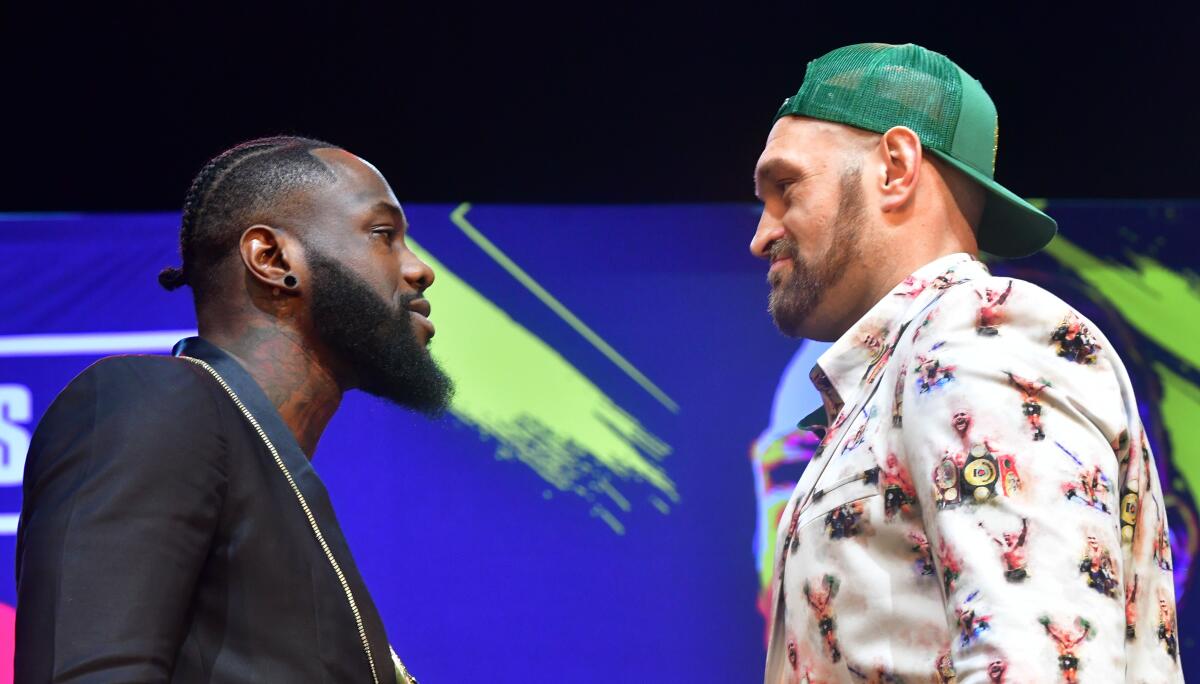
Fury stands today 6 feet 9. He’s reduced his weight to just over 250 pounds, and credits his 27-year-old former trainer, Ben Davison.
“When you’re battling in your own mind, that’s the hardest fight anyone can ever have,” Fury said. “Boxing to me is like being a fish in the water. I was born to do it. I have no other interests or hobbies outside of boxing.”
After two tuneup bouts in the summer of 2018, Fury faced Wilder, the WBC champion, that December and mostly outboxed the 2008 Olympic bronze medalist, landing 84 punches to his 71. He succumbed, however, to Wilder’s devastating right hand twice and suffered two knockdowns, including a vicious one in the 12th round.
But much like he’d done in his personal life, Fury unexpectedly rose and continued fighting to the final bell. Many observers believed he should have won by decision, but more importantly, he resuscitated his standing in the sport.
Fury will again meet Wilder (42-0-1, 41 KOs) next month on ESPN and Fox pay-per-view, hoping to settle the score away from the judges’ cards with a definitive knockout.
“I’m not worried about the fight. It’s just another boxing match for me,” Fury said. “Getting punched in the face is nothing. When you’ve been to where I’ve been, I’ve been hit harder than any man has ever punched me in his life, with mental illness. Boxing is easy compared to that.”
Since his comeback, the frank and forthright Fury has made himself a relatable figure for those fighting mental health issues. He sends uplifting and encouraging messages on social media to others suffering.
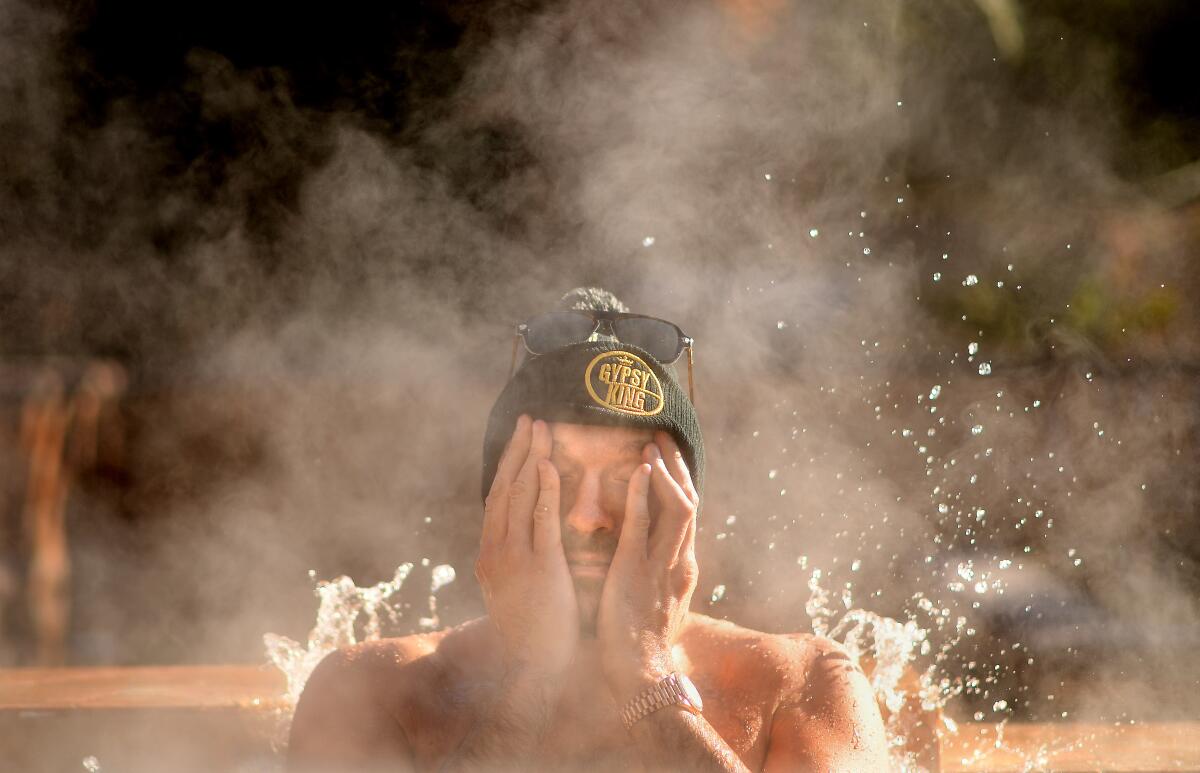
On the flip side, he also understands being an entertainer, as evidenced by his outlandish antics and his recent turn as a WWE wrestler. Fury wears suits with images adorned with his own likeness. He’s nicknamed the Gypsy King, but has never listened to the band’s songs. He’ll charm viewers with his gregarious personality by sticking out his tongue at opponents, and sing in the ring to his wife, Paris, after victories. Then he’ll self-destruct and turn off fans with offensive remarks about women, religion and homosexuality.
“Anything conventional ain’t for me,” Fury said. “One day I wake up in a good mood, the other I’m down and depressed. I’m starting to really understand myself now after 31 years.”
Fury’s unpredictability was displayed in December when he and Davison suddenly split, just days after the trainer was scouting Wilder’s most recent fight in person at the MGM Grand.
Fury reached out to former fighter, confidant and current assistant coach Andy Lee, and expressed that he wasn’t satisfied with Davison anymore. In his last fight, Fury had a harder time than anticipated when he won by decision over the unheralded Otto Wallin, yet suffered two cuts across his right eye that required 47 stitches.
After considering over a dozen coaches, Lee and Fury zeroed in on Javon ‘SugarHill’ Steward, the nephew and disciple of the late, great trainer Emanuel Steward. Lee was coached his entire career by Emanuel and he believed Fury needed the renowned Kronk Gym mystique, attitude and mind-set.
Fury’s camp agreed that SugarHill was the authoritarian figure necessary to shape the fighter’s fiery personality and career — all while offering techniques on how to improve his power, much like Emanuel did with Thomas Hearns and Lennox Lewis during his heyday.
Fury’s relationship with the Stewards began in 2010 in Detroit at Kronk, and continued abroad in Austria and Canada. He remained friendly with the duo but never trained with them because Emanuel was coaching Klitschko, the foe he’d later overthrow.
“Emanuel and I connected like a house on fire. I liked to spend time with him. I brought on SugarHill to add a little bit more sugar to the cake,” Fury said. “I don’t think I have a missing ingredient. I’m unbeaten. I’m a finished article.”
The initial plan was for the U.K.-based Davison to remain with the team in Las Vegas and take a backseat to Steward as an assistant coach, but that idea was quickly dashed. Even though Davison had led Fury out of the dark days, the fighter said splitting with his trainer wasn’t difficult or emotional.
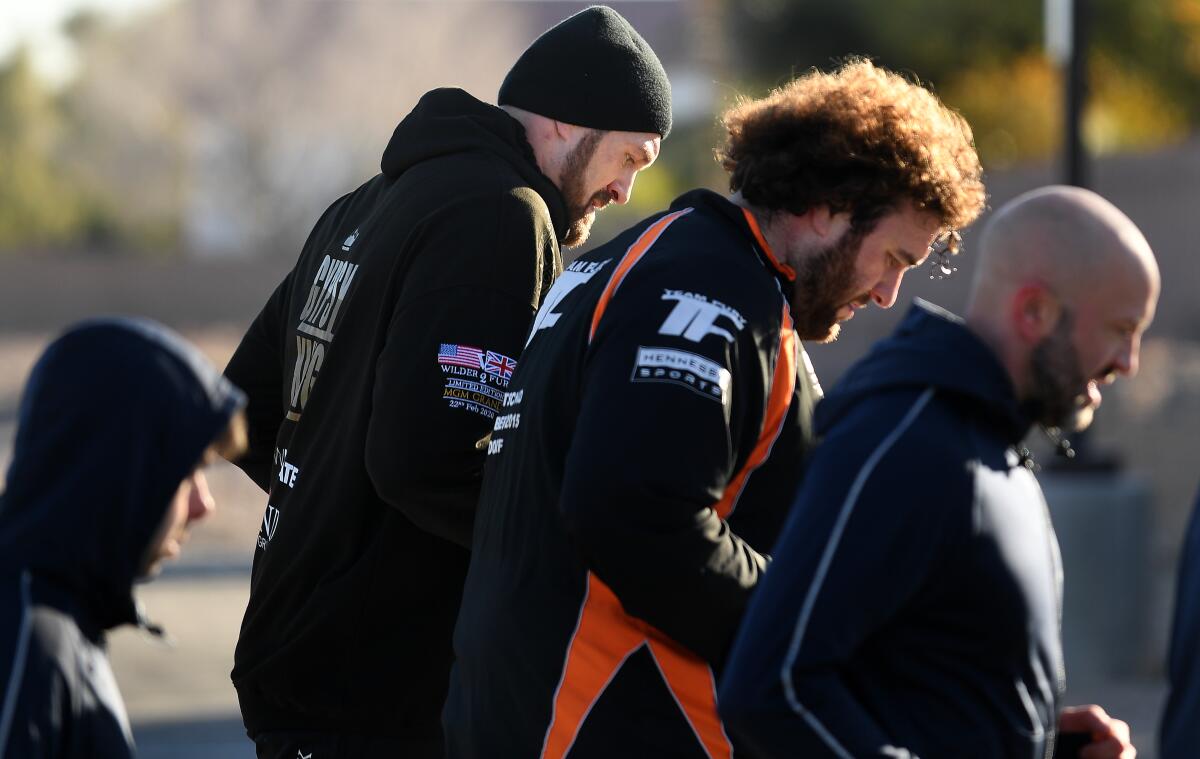
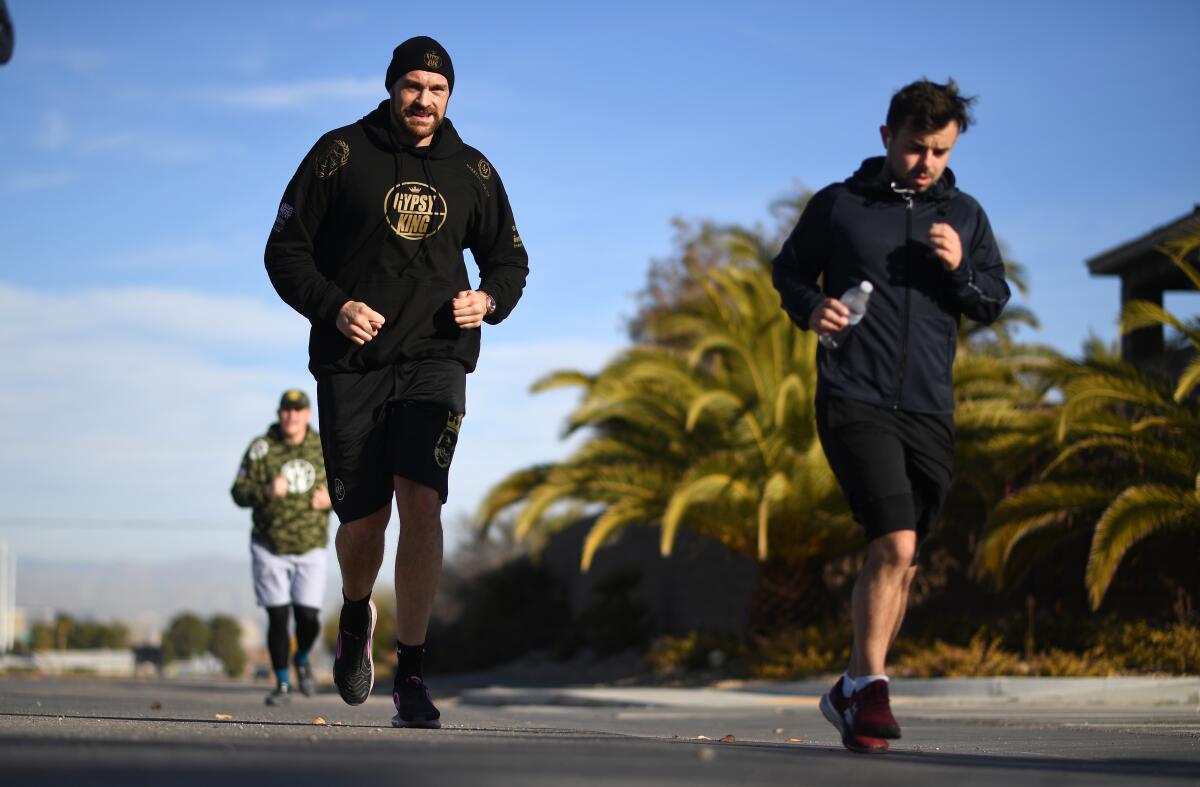
“Ben and I haven’t had a falling out in any way, shape or form. It’s not personal,” Fury said. “This is my business and how I earn money to provide for my family. I have to make the right decisions for me.”
Davison still engages with Fury on social media and has a collage of pictures of the fighter across his profiles with remnants of their past.
“He’s my friend, and I want to keep it respectful,” Davison said. “I’m just happy to say that everything’s all good.”
Fury has also brought on Conor McGregor’s nutritionist George Lockhart, a former U.S. Marine. Fury is drinking eight liters of water and eating five meals a day, accounting for the most calories he’s ever consumed.
“Working with George has been a real big eye-opener,” Fury said. “He’s a food guru. I’m not losing weight. I’m already where I want to be. I feel strong and fit. If that stuff means anything, it will show in this fight.”
Steward, meanwhile, is tasked with preparing Fury to back his prediction of knocking out Wilder by the second round. They are avoiding punches to the head during sparring because they fear the cut could reopen and jeopardize the fight.
“The Kronk style produces knockouts,” Steward said. “We want to knock out the guy who knocks out everyone else — the biggest bully in the schoolyard — so everyone else in the division will take notice. That’s what Tyson wants, what I want, and what Emanuel would have wanted.”
Fury feels he’s always had knockout power, but never applied it in big fights because he preferred to stick-and-move around opponents. This time, he wants to stand toe-to-toe in the middle of the ring and slug it out with Wilder to shun the judges altogether.
Another division-defining rematch is in store as Deontay Wilder will take on Tyson Fury in a rematch at the MGM Grand in Las Vegas.
“I hope the cut [over the eye] doesn’t hold up. I hope it opens in round one. Make it a real blood sport,” Fury said. “I got up after his two best shots last time. When you’ve been smashed, rocked and dropped, training, family or millions of fans can’t help you.
“You have to stand up and fight for what you believe in life — for every [mentally] unwell person in the world, for the oppressed people, for all the down and outs, bums, alcoholics, drug addicts and prostitutes — everybody. I fight for those people.”
Fury will make tens of millions of dollars for his bout against Wilder, but he said the career-high payday will not change him. He’s simply thankful for the fresh air he breathes today, and the blessing of keeping himself busy with the sweet science. What comes after retirement for Fury, a phase plenty of athletes struggle with, could perhaps prove harder to overcome than a punch any fighter swings his way.
“I hate holidays, I hate breaks, I hate festive seasons, I hate it all,” Fury said. “I’m a workaholic. I love being regimented. Some people want to get rich, retire on the beach and relax all day. I’d last about a week. ... doing that sort of stuff.
“People ask me, ‘What’s after boxing?’ I really don’t know. Boxing and training is the only thing that drives me. Nothing else matters. If I can’t train anymore, that’s the day I die. I’m just being honest.”
More to Read
Go beyond the scoreboard
Get the latest on L.A.'s teams in the daily Sports Report newsletter.
You may occasionally receive promotional content from the Los Angeles Times.
